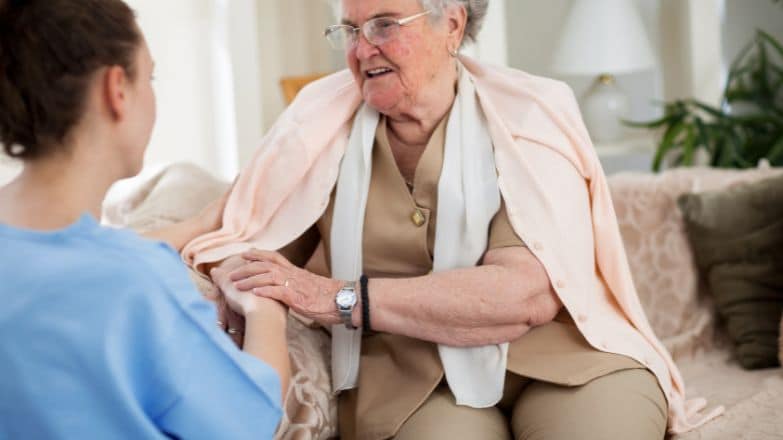Are you ready to enhance your caregiving skills for the elderly? The Community Care Toolkit is here to help you become an exceptional caregiver. This comprehensive guide will equip you with over 30 modules designed to fine-tune your abilities, whether you're providing at home care or working in a residential setting. From providing top-notch services to mastering advanced techniques, this toolkit will give you the confidence to give your best in this rewarding field. So, gear up to transform your journey into a remarkable road of success with the Community Care Toolkit today!

Understanding the Importance of Positive Interactions
Positive interactions with the elderly play a pivotal role in ensuring their overall well-being, improving their quality of life. They aren't just for momentary happiness but have deep-rooted effects on their health as well.
The Role of Positive Interactions in Elderly Well-Being
For us, positive interactions mean an exchange that results in a positive emotional experience. They can be as simple as pleasant conversations, respectful engagements or even shared laughter. When it comes to the elderly, these interactions have a crucial role in their well-being. It helps reduce feelings of loneliness and isolation, fostering a sense of belonging and validation.
Impact of Social Interaction on Mental Health
One significant aspect that often goes unnoticed is the impact of positive social interactions on the mental health of seniors. These interactions can decrease feelings of depression, combat dementia, and even slow cognitive decline. Social interactions help keep their minds active, ultimately leading to improved memory and cognitive functions.
The Link Between Happiness and Positive Social Exposure
Among the elderly population, a strong link has been found between happiness and positive social exposure. This is because positive social interactions often lead to a better mood and a more positive outlook on life. By facilitating their engagement with community and social activities, we can help uplift their spirits and foster a sense of happiness.
Setting the Tone for Positive Interactions
Creating a positive interaction requires a friendly atmosphere, patience, and effective communication.
Tips for Creating a Friendly Atmosphere
A friendly atmosphere for the elderly rests on warmth, respect, and kindness. Simple gestures, like a warm greeting, a patient ear, or an empathetic understanding, can go a long way in setting a friendly tone.
Understanding the Importance of Patience
Patience is another essential aspect. The elderly might take slightly longer to respond or perform activities. Showing patience sends a signal that we value them and their contributions, irrespective of the time it takes.
How to Communicate Effectively with Elders
Communicating effectively with the elderly means listening actively and speaking respectfully, clearly, and slowly. Ensuring that our messages are comprehensible and our responses thoughtful makes them feel heard and understood.
Get The Complete Guide for Successful Interactions
Essentials of Communication with the Elderly
Communication with the elderly should be conducted with reverence and compassion.
Adopting a Respectful Tone
In our interactions, we must respect the elderly. Choosing gentle words, showing courtesy, avoiding ageist language can make our conversations more respectful and appreciated.
Active Listening Skills
Active listening is when we are fully engaged in what our seniors are sharing. This means avoiding distractions, offering affirmations, and responding relevantly. A crucial aspect of this engagement helps the elderly feel understood and cared for.
Addressing Seniors Correctly and Appropriately
Using preferred names or titles is crucial. It exhibits respect and affirms their identity.
Challenging Stereotypes about Aging
Stereotypes about aging can often get in the way of positive interactions.
Challenging the Stereotype of 'Old and Feeble'
One prominent stereotype that we need to challenge is that the elderly are 'old and feeble'. Peel off the stereotype and you'll find individuals who are resilient, resourceful, and capable of many tasks.
Promoting a Positive View of Aging
We should promote a positive view of aging — one that respects their rich experiences, acknowledges their valuable insights, and appreciates their wisdom. It's not only about growing old but also about growing and evolving.
Appreciating the Wisdom and Life Experience of Seniors
Acknowledging and respecting the valuable wisdom that comes from their years of life experience manifests a positive view of aging.

Practicing Empathy and Understanding
Empathy and understanding can be the most powerful tools that foster positive interactions.
Recognizing Emotions in the Elderly
We can practice empathetic acknowledgement by recognizing and validating the feelings of seniors. If they seem upset, disheartened, or frustrated, don't dismiss it. Acknowledge their feelings and exhibit empathy.
Ways to Show Empathy
Active listening, non-verbal cues like compassionate eye contact, paraphrasing their feelings, or providing comforting statements can exhibit empathy.
Understanding Common Elderly Struggles and Fears
Understand and appreciate their unique experiences and struggles. It could be about losing loved ones, the fear of illness, or the lose of independence. Recognize these struggles and offer reassurances and support.
Building Trust and Strong Relationships
Trust and respect shape the foundation of strong and sustained interactions.
Establishing a Trusting Environment
To create a trusting environment, be consistent, dependable, honest and patient in interactions. If we promise to visit, we must ensure we follow through. If they share personal stories with us, we need to honor their trust by keeping their stories confidential.
Maintaining Consistency in Interactions
Consistency in our actions and words plays a key role in building trust. When we consistently show up and engage positively, it strengthens the relationship, creating an atmosphere of reliability.
Showing Respect for Personal Boundaries and Privacy
Each individual has their own comfort zone and privacy that should always be respected. By understanding and respecting their space, we create an environment where they feel secure and comfortable.

Engaging the Elderly in Activities
Engaging the elderly in activities helps to keep them active and mentally stimulated.
Age-Appropriate Activities
Activities like simple games, art and craft, gardening, or reading can help to keep them engaged. Ensure these activities suit their interests and ability levels.
Engaging in Discussions About Personal Interests
This can range from their favorite pastimes to their life's significant events. Such discussions not only make them feel valued but also strengthens our bond with them.
Promoting Mental and Physical Activities
Encourage both mental and physical activities. Yoga, chair exercises, puzzles, and memory games can help in keeping them active both mentally and physically.
Understanding and Addressing Elderly Needs
Be it physical, emotional, or social; elderly needs should always be understood and catered to effectively.
Being Aware of the Basic Needs of Seniors
Basic needs like regular meals, adequate sleep, and daily hygiene play a significant role in their overall well-being. Awareness and arrangements for these needs can enhance their quality of life.
Addressing Emotional Needs
Elderly emotional needs could be companionship, validation, respect, or the need to be heard. Identifying, understanding, and addressing these needs can make a big difference in their emotional health.
Addressing Elderly Person's Health and Mobility Concerns
Aging can bring health and mobility challenges. From constant health monitoring to arranging assistive devices, catering to these concerns displays our empathy and commitment towards them.

Using Technology to Enhance Interaction
Technology, when used correctly, can enhance our interactions with the elderly.
Exploring User-Friendly Technologies for Seniors
Introducing seniors to smartphones or tablets with easy-to-use interfaces can open up an array of possibilities for interaction. Consider social media platforms and video call applications that provide a great way to keep in touch.
Benefits of Technology in Promoting Social Interaction
Through technology, seniors can connect with friends and family, access entertainment, and learn new things. It's about educating them on safe and relevant usage.
Using Technology to Bridge the Generational Gap
Technology can serve as a common ground. Teach them simple technological operations; make them feel updated and valued. This not only fills the generational gap but also offers a sense of fulfillment.
Overcoming Barriers to Positive Interactions
Positive interactions could sometimes be faced with hurdles. Understanding these barriers will equip us to handle them better.
Dealing with Difficult Emotions or Behavior
Elders might display difficult emotions or behavior due to various factors. Identify the cause, show understanding, and approach the situation with patience and love.
Recognizing Signs of Depression or Anxiety in Seniors
Signs of depression or anxiety in seniors can range from decreased interest in activities, changes in appetite, excessive worry, or mood swings. Once identified, professional help should be arranged.
Addressing the Issue of Social Isolation and Loneliness
For seniors, social isolation and loneliness can have grave consequences. Encourage social engagements, arrange for visits from friends or family, and promote involvement in community activities to combat these feelings.
In essence, fostering positive interactions can help significantly elevate the quality of life for the elderly. It enriches their mind, uplifts their spirits, and fills their lives with warmth and happiness. We all have the power to offer these valuable experiences to our seniors and manifest a pleasant difference in their lives.
